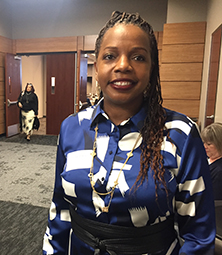YOUNGSTOWN, Ohio – Matthew Desmond downplays the many accolades for his book “Evicted: Poverty and Profit in the American City,” published in 2016.
The book earned the author a Pulitzer Prize, a National Book Club Award, the Robert F. Kennedy Book Award and the PEN/John Kenneth Galbraith Award for nonfiction, among others, and was a New York Times bestseller – any writer’s dream.
For Desmond though, the most meaningful affirmation of his work isn’t the critical acclaim. Rather, it’s the impact studies like his could have toward developing a fairer and more equitable housing policy that protects the most vulnerable from sinking deeper into poverty or homelessness.
“It was a book that was kind of able to open doors for advocates and organizers who have been knocking on those doors for a long time,” Desmond said April 20 during the Mahoning Valley Eviction Prevention Summit at the Eastwood Event Centre in Niles.

The summit was presented by Community Legal Aid and sponsored by many other nonprofit agencies across the region. More than 250 attended.
Desmond, the featured speaker, engaged in an hour-long question and answer session with moderator Andy Gray. Gray is the entertainment editor of the Tribune Chronicle.
He says the book’s publication coincided with many grassroots housing movements across the United States that were already pushing for reform. “We’ve seen a lot of energy in states that have organized and moved policy in response to folks like us elevating this issue,” Desmond says.
At the federal level, Desmond says, policy reform is possible as demonstrated during the COVID-19 pandemic. “My team and I were on the phone with the White House every week trying to motivate an eviction moratorium,” he says. “We got a moratorium under the Trump administration.”
Desmond suggests that the moratorium helped to reduce the number of deaths during the pandemic by 11%. The program demonstrated how what he called “bold relief” from the federal government could make a significant difference. He referred to the moratorium, emergency rent relief, and programs such as the child tax credits issued during the pandemic.
Child poverty decreased by 46% while housing assistance programs drove evictions down, Desmond says. These programs were temporary, however, and were lifted once the pandemic subsided.
“We didn’t celebrate those with enough vigor,” Desmond says.
Desmond is the Maurice P. During professor of sociology at Princeton University and the principal investigator of The Eviction Lab, a comprehensive dataset of evictions across the United States.
His book “Evicted” chronicles the lives of eight families in Milwaukee as they struggle to survive under the ever-present threat of eviction from their houses or apartments during the housing crisis of 2007-2008. His work argues that evictions are often the cause, rather than a symptom, of poverty in America.
He is the author of four other books: “The Racial Order” (2015); “Race in America” (2015); “On the Fireline: Living and Dying with Wildland Firefighters” (2007); and his latest, “Poverty, By America,” published this year and currently on nonfiction bestseller lists.
Desmond relates that he grew up in a poor household in Winslow, Arizona. “Our gas got turned off when I was in college. We lost our childhood home,” he recalls. “I think those experiences worked their way inside of me.”
He used student loans to attend Arizona State University and received his undergraduate degree in communications and justice studies. Desmond was awarded his Ph.D. in sociology from the University of Wisconsin.
“Evicted” is an outgrowth of his doctoral dissertation, which focused on eviction rates in Milwaukee. He selected the Wisconsin city because he believed it provided an honest representation of the housing crisis, mirroring other urban centers such as Cleveland and Pittsburgh.
“I moved to Milwaukee and I saw a level of poverty that I never experienced and I never had seen before,” he says. “You can see the housing crisis in a whole new light,” by concentrating on these cities instead of higher rent areas such as San Francisco or Seattle.
At the time, there were few studies that shed light on the immense problem of evictions. When Desmond examined his data relative to Milwaukee, he found that one in 14 renters in the inner city was evicted every year. “I was like, ‘We got the numbers wrong.’ But, we were right,” he says. “I didn’t expect evictions to be so common.”
Even more revealing is that when Desmond helped to compile the national database at Eviction Lab, Milwaukee didn’t even crack the top 50 in eviction rates among American cities. “That was a shocker to me – just how commonplace eviction and homelessness are in America.”
At the same time, profit margins among landlords in poorer neighborhoods climbed. Desmond, for example, moved into a low-income mobile home park and convinced the owner of the park to let him inspect its financials. After assessing vacancies, missed payments, expenses such as utility bills and taxes, Desmond discovered that the owner of the poorest trailer park in Milwaukee was clearing more than $400,000 per year.
This encouraged Desmond to look into landlord profit margins in low-income areas on a national scale. He found that landlords in poor neighborhoods were not just making more than their counterparts in affluent neighborhoods, but double.
“The reason is their property expenses are a lot lower. But rents aren’t that much lower in poorer neighborhoods,” Desmond says. “That was a shocker to me.”
Families with few or no options and in desperate need of housing are therefore trapped in a system where rents are exorbitantly high, forcing them to spend on average half of their income on rent.
“One in four of those families spends more than 70% of their income just on rent and utilities,” he says. “That’s not because they’re making bad decisions. They’re living in the cheapest apartments that are still massively unaffordable. When folks have no choice, they’re exploitable.”
Low-income families who are cut out of home ownership and housing assistance – the waiting list for public housing, for example, is now measured in decades, not years – must turn to the private market. “Often, you’re in a situation where you can be overcharged for something that’s not worth what you’re paying for.”
Federal assistance to address this widespread problem has often been met with criticism from those who argue that it’s fiscally irresponsible, Desmond says. In the wake of COVID, for example, critics claim that this spending contributed to overheating the economy and the ensuing inflation. “I think that’s bonkers,” he says.
Data show that in the 40 years before COVID, labor costs traditionally accounted for 60% of inflationary pressure while corporate profits accounted for 11%. “During COVID, it flipped,” Desmond says. “Labor pressure accounted for about 8% of inflationary pressure while corporate markups accounted for 58% of inflationary pressure.”
Others argue that the federal government can’t afford to spend $100 billion a year on programs such as child tax credits, Desmond says.
“A study published several years ago shows that if the top 1% of Americans just paid the taxes they owed, that we as a nation could raise an additional $175 billion a year,” he says. “That’s enough to double federal investment in federal housing and still have money left over.”
Another solution is to adopt policies that provide more transparency during the eviction process, especially identifying landlords, and reforming rules that in some states make it easier to file eviction actions.
“I do not think eviction court should be a collection mechanism for property owners,” Desmond says. “I also don’t think evicted tenants should pay late fees or court fees often because they just have the wrong job.”
Warren Mayor Doug Franklin says Desmond’s message is “very powerful” and reinforces what communities such as his have experienced as a result of the housing crisis. “It affects every facet of community life,” he says.
Franklin says he was impressed by the strong turnout for the eviction summit. The daylong event included panel discussions that examined facets of housing law, solutions to access affordable housing, lessons from the pandemic and challenges ahead.
“We have so many professionals in this space today who can come up with creative, innovative solutions and alternatives to address these problems,” Franklin says. “That hasn’t happened on a scale like this in all of my years of public service. I’m very encouraged.”
Youngstown Municipal Court Judge Carla Baldwin says advocates such as Desmond are effective in placing faces and names in front of the eviction crisis. “It’s often seen as a process,” she says. “We’re not just dealing with a stack of files. We’re dealing with mothers and fathers and children who are being displaced.”
Baldwin relates that summits such as this are essential in driving forward a collective effort to alleviate the housing problems in the region.
“We have the resources and the manpower to change that reality across the country,” she says, “and especially here in the Mahoning Valley.”
The judge says that she had no idea how steep the eviction crisis was until she was elected to the bench in 2017.
“I sign off on half of the writs – and it’s just stacks and stacks and stacks. These are people. And where do they go?” she asks. “If you never have to question where you lay your head tonight, be grateful.”
Pictured at top: Matthew Desmond won the Pulitzer Prize for his book about evictions and poverty.
